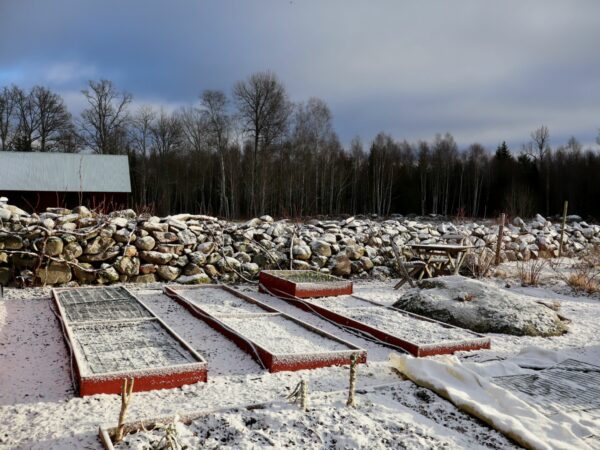Storing Carrots in a Root Clamp
I can't believe how convenient it is to store vegetables in a root clamp. I make them in my greenhouse and bury carrots and other root vegetables I want to keep here long-term.

I put these carrots in a root clamp in the greenhouse, and I plan on keeping them here all winter.
The carrot is probably one of the most useful vegetables in my garden, so I want to grow enough to last us for the rest of the year. It usually works just fine. I don't actually remember the last time we bought a bag of carrots from the store. Our garden delivers all the carrots we need and I'm so happy to say that we're self-sufficient in these delicious root vegetables. My kids absolutely love them too, fresh carrot sticks is one of their favorites. But we can use them for so much more too of course.
More: How to grow carrots in a carton
I sow carrots in winter, spring and summer and alternate between different types for the different seasons. My winter carrots are the ones I harvest in late fall and then store over winter.
Since we don't have much storage space outside of the house, I often create root clamps instead. This is the perfect way to store root vegetables. I can keep them here all winter and just get a few whenever I need them.

Some of the carrots I grew in my garden this year. I removed the tops and now it's time to put my carrots in the root clamp.
What is a Root Clamp?
A root clamp is simply put an underground storage space for root vegetables. We just dig a hole that we put the vegetables in, either right on the ground or perhaps in a basket or crate. The temperature in the hole should be cool enough to get the vegetables into a resting state, so that they stop growing. Around 40 degrees (4 degrees Celsius) should be fine. Just make sure that it isn't too cold though. You don't want your root vegetables to freeze.
Since we sometimes have snow in the garden, I actually prefer creating my root clamp in the greenhouse. It's a lot easier to dig them out here.
Read more: How to prevent carrot fly infestations
If you happen to come by older books about growing your own food, you can find a lot of intricate methods to create root clamps. But, it doesn't actually have to be that hard. Your version of a root clamp could for example be just keeping a bucket of root vegetables in a bucket inside your greenhouse. This works best in milder climates, but you could of course just wrap your bucket in an old rug or similar to keep it from freezing. I actually kept crates filled with root vegetables in my polytunnel until February, and it worked really well! This might be a great option for anyone who can't dig a hole in the greenhouse. Why not just put a few buckets in large styrofoam boxes, for example?
I made two root clamps in my greenhouse this year, since I have so many carrots and beets that I need to store. I put all of the vegetables in crates and baskets, so they aren't completely surrounded by soil. Surprisingly many actually fit here!

It might not look like much from the start, but it's going to turn out great! I dug two holes in this bed for my root clamps.

I buried this basket filled with root vegetables and leaves in the ground. This is what a root clamp can look like!

A large pile of old leaves cover the root clamp. I also decided to water the leaves before I put the lid on top. The lid keeps condensation from dripping into the pile and also stops curious cats from digging here.
Remember to:
- dig a deep hole that keeps the cold from reaching the vegetables
- put a layer of soil around them
- use leaves, soil, woodchips or similar as insulation on top
- water the vegetables so that they are slightly damp
- not bury the vegetables while still warm
Read more: 5 Ways to store carrots
Remember that the vegetables shouldn't start growing when buried. It takes a lot of energy to for example create carrot tops, and this will in turn affect the quality and flavor of the root. That's why you should wait until it gets properly cold before you put the vegetables in the root clamp. This is especially important to think about if you make your root clamp in the greenhouse, where it's generally a lot warmer than outside.
I'm hoping to store the vegetables here until March-April. This is the time of year (in zone 3) when the soil in the greenhouse gets so warm that the root vegetables start growing tops. Just get them out of the root clamp and put your vegetables in the fridge when this happens. We usually start to run out of carrots in spring and have to do without them for a few weeks before we can start harvesting the winter sowings. If everything goes according to plan, then I'll be able to harvest early carrots in a larger hotbed outside next year. I can't wait!
/Sara Bäckmo



Leave a Reply
You must be logged in to post a comment.